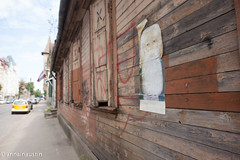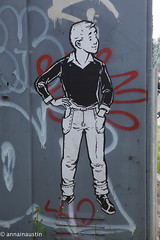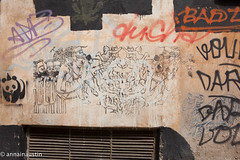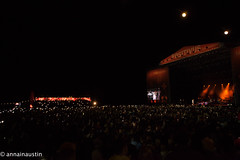It’s a long way from Latvia to a SXSW show
 The most dramatic symbol of the colossal changes that have taken place during the 20 years of the South by Southwest Music Festival might actually be a tiny lapel pin worn by a visiting musician.
The most dramatic symbol of the colossal changes that have taken place during the 20 years of the South by Southwest Music Festival might actually be a tiny lapel pin worn by a visiting musician.
Latvian singer-songwriter Goran Gora, 22, wears a star-shaped Soviet-era medal of Vladimir Ilyich Lenin as a sweet-faced, tousle-headed child, rather than the stern baldie of later years. (Lenin is best known in the West as the bald and pickled man who still lies in state in Moscow’s Red Square.)
Gora explains that during Soviet times, good Latvian schoolchildren wore this medal as members of the Communist group the Young Pioneers. Nowadays, Gora wears his star turned upside down, and he’s even willing to have his picture taken wearing it that way — something that 20 years ago would likely have had dire consequences for the wearer.
“It is like breaking the rules,” Gora said of his pin, a sort of literal inversion of the old rules of society, and also symbolic of the rule-twisting of punk rock.
Gora’s pal, promoter and Latvian DJ Toms Grevins, 24, defines the turned pin as “punk rock aesthetics.”
Dace Volfa, 33, a fellow member of SXSW’s “Team Goran” and editor of the popular music section of the Latvian music magazine “Muzikas Saule,” is old enough to have worn the pin herself in school.
But never mind the pin. Where’s Latvia? Latvia is located roughly between Sweden and Russia, and the term roughly does apply. With part of Latvia’s border comprised of the highly desirable Baltic Sea coastline, Latvia — and its Baltic-state neighbors of Estonia and Lithuania — has been repeatedly invaded, spending much of the 20th century in what President Reagan called the “evil empire” of the Soviet Union. These days, Latvia is an independent country with membership in NATO and the European Union. Latvia even joined the “coalition of the willing” in Iraq.
One of the great treats of SXSW is investigating music from other parts of the globe. This year, I’ve spent time getting a crash course in Latvian radio. That’s because Latvian radio is how Gora came to play at SXSW.
About a year ago, Gora recorded some demo tracks in a friend’s basement studio in his hometown of Baldone, Latvia, a town of 7,000 just outside Riga.
Gora produced and mixed the recordings, then his friends sent these demo tapes to the nationwide Latvian broadcast Radio SWH, where Grevins has a weekly new music show. When he played Gora’s music, people e-mailed asking for more Gora, a situation Grevins describes as unprecedented. After a chance meeting at a music festival, the pair soon headed to a professional recording studio for Gora’s first studio produced song, “Slow Down.” Gora’s trip to SXSW was Grevins’ idea. “Team Goran” tells me SXSW is not well known in Latvia.
Like some current radio airplay songs, including Aqualung’s “Brighter than Sunshine” and James Blunt’s “You’re Beautiful,” much of Gora’s music falls into the “catchy but mopey” category — exactly the musical style I wallowed in when I was Gora’s age and suffering from heartbreak.
After listening to Gora’s music on the Internet’s myspace.com Web site, I was expecting that shadowing Gora during SXSW would be closer to “Mope by Mopewest.” I was expecting to be despondent by the end of the week from an overdose of lovelorn music. I was pleasantly surprised. A live set of Gora’s music is sweet and touching, rather than sad — sort of like how Belle & Sebastian and Morrissey are mournful on disc but lively in concert. Gora’s song “Two Hands” is pretty catchy, too. It’s earned a place on my iPod, just as soon as I recover from SXSW. I am not alone in my appreciation of the song. “Two Hands” is currently No. 9 the top 40 chart on the Radio SWH Web site, while Morrissey’s “You Have Killed Me” is only No. 27.
You might expect someone who makes such beautifully sad recordings to be personally glum. Instead Gora is practically bubbly, although with his close-cropped brown hair and black suit jacket, he physically resembles mope master Morrissey, onetime singer for The Smiths.
Twenty years ago, if a Latvian performer had politically been able to leave Latvia and play at SXSW, it would have generated immense publicity and buzz, even if the band’s songs had sounded like a cat with a hangover yowling for his breakfast. Lines for the venue would have been out the door, TV crews would have been fighting for the best spot and the musician would have been the hit of the festival.
Alas for Gora, that wasn’t the case this week. It’s a testament to how much the world has changed that a performer coming from the former Soviet Union didn’t attract much of a crowd for his 8 p.m. slot on Thursday’s European music showcase at Spiro’s.
The fact that the performance of a once-Soviet musician wasn’t even a piffle on the international radar is a good thing for the world, even if it’s not such good thing for Gora’s musical career. We wouldn’t want to go back to the bad ol’ days of the Cold War, when Gora wouldn’t have been allowed to play SXSW — never mind being able to wear his vintage Soviet star literally spun with an eye toward “punk rock aesthetics.”
The world has changed over the past 20 years, and SXSW reflects that. Freedom rocks.




















